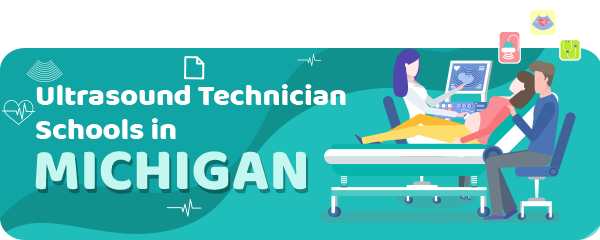Maybe you are considering becoming an ultrasound technician.
This career is fulfilling, but you will need to fulfill some requirements first.
Let’s have a look at the training you have to undergo before getting your license.
Article Table of Contents
Training Requirements
First of all, you need to attend a training program.
The program must be approved by the Commission on Accreditation of Allied Health.
The training course you choose can be finished either in person or online.
To get only a certification, you need to study one year after which you will have to pass an exam.
You can also opt for an associate’s or bachelor’s degree, which varies in length and last from 2 to 4 years.
The subjects you will learn during your training period include:
- Pathophysiology,
- Vascular ultrasound,
- Ultrasound physics.
| School Name | Address |
|---|---|
| Baker College | 1500 University Dr, Auburn Hills, Michigan 48326 |
| Baker College | 1020 S Washington St, Owosso, Michigan 48867 |
| Bay de Noc Community College | 2001 N Lincoln Road, Escanaba, Michigan 49829 |
| Delta College | 1961 Delta Road, University Center, Michigan 48710 |
| Dorsey Schools | 31739 John R Rd, Madison Heights, MI 48071 |
| Ferris State University | 1201 S State St, Big Rapids, Michigan 49307 |
| Grand Valley State University | 1 Campus Dr, Allendale, Michigan 49401 |
| Grand Valley State University | 301 Michigan Street NE Grand Rapids, MI 49503 |
| Henry Ford Hospital | 2799 West Grand Blvd Detroit, MI 48202 |
| Jackson College | 2111 Emmons Rd, Jackson, Michigan 49201 |
| Kirtland Community College | 10775 N Saint Helen Road, Roscommon, Michigan 48653 |
| Lake Michigan College | 2755 East Napier Avenue, Benton Harbor, Michigan 49022 |
| Lansing Community College | 419 N Capitol Ave, Lansing, Michigan 48901 |
| Oakland Community College | 2480 Opdyke Rd, Bloomfield Hills, Michigan 48304 |
| Providence Hospital/Madonna University | 16001 West Nine Mile Road Southfield, MI 48075 |
| Siena Heights University | 1247 E. Siena Heights Dr, Adrian, Michigan 49221 |
To qualify for the license, you must also have 6 months of practical experience with sonography devices and technology.
License Requirements
Holding an ultrasound license is not required in this state, however, it will make it easy to get hired and find a good job.
The exams and licenses are managed The American Registry for Diagnostic Medical Sonography.
Some of the topics covered in the exam are echocardiography, abdomen, breast sonography, neurosonography, obstetrics, and gynecology.
The ultrasound tech test can be taken at one of the numerous centers spread throughout the state.
You are also allowed to get a license from a non-approved school, however, you will first need:
- 60 semester hours
- A mandatory internship
- One year of work experience.
Other entities offering sonography licenses are Cardiovascular Credentialing International and The American Registry of Radiologic Technologists.
In order to get a license this way, you will need 800 hours of experience before applying for the license.
You will also need to renew your license every 24 months, for which you have to take 24 extra education credits.
How Can You Get Hired?
In Michigan, the job prospects for ultrasound technicians are constantly growing.
If you opt for a bachelor’s or associate’s degree, you will be able to earn more although the programs take longer to finish.
According to O*Net, ultrasound tech jobs will see a growth of 19 percent between the 2016-2026 period.
If you choose to pursue this career field, you can get hired in a medical lab, clinic, hospital or any other medical facility.
As of now, another source reports an average salary of $76,428 per year, for the ultrasound techs in Michigan.
However, as the field has several specialties, the income varies from specialty to specialty and is also influenced by other factors.
Annual Salary Range:| Location | Avg. Annual Salary |
|---|---|
| Detroit | $78,246 |
| Grand Rapids | $74,511 |
| Warren | $78,246 |
| Sterling Heights | $78,001 |
| Ann Arbor | $79,353 |
| Lansing | $74,771 |
| Flint | $70,843 |
| Dearborn | $78,246 |
| Livonia | $78,001 |
| Troy | $77,961 |
Regional Salary in Michigan
| Region | Employed | Avg. Annual Salary | Avg. Hourly Pay | Top 10% Annual Salary | Bottom 10% Annual Salary |
|---|---|---|---|---|---|
| Ann Arbor, MI | 260 | $83,600 | $40.19 | $87,830 | $75,010 |
| Detroit-Warren-Dearborn, MI | 1,430 | $79,180 | $38.07 | $92,310 | $65,260 |
| Flint, MI | 110 | $77,360 | $37.19 | $86,180 | $65,320 |
| Grand Rapids-Wyoming-Kentwood, MI | 380 | $78,020 | $37.51 | $85,310 | $65,300 |
| Lansing-East Lansing, MI | 110 | $76,020 | $36.55 | $84,600 | $63,180 |
| Niles, MI | 50 | $77,500 | $37.26 | $82,280 | $65,900 |
| Saginaw, MI | 50 | $80,670 | $38.78 | $94,290 | $64,600 |
| Traverse City, MI | 80 | $77,410 | $37.22 | $100,210 | $66,290 |
* Employment conditions in your area may vary.
In order to start your new career in the medical field, the first step is enrolling in a program.
This will ensure you get the appropriate training to become a successful ultrasound technician.
Read the full guide: How to Become an Ultrasound Technician
